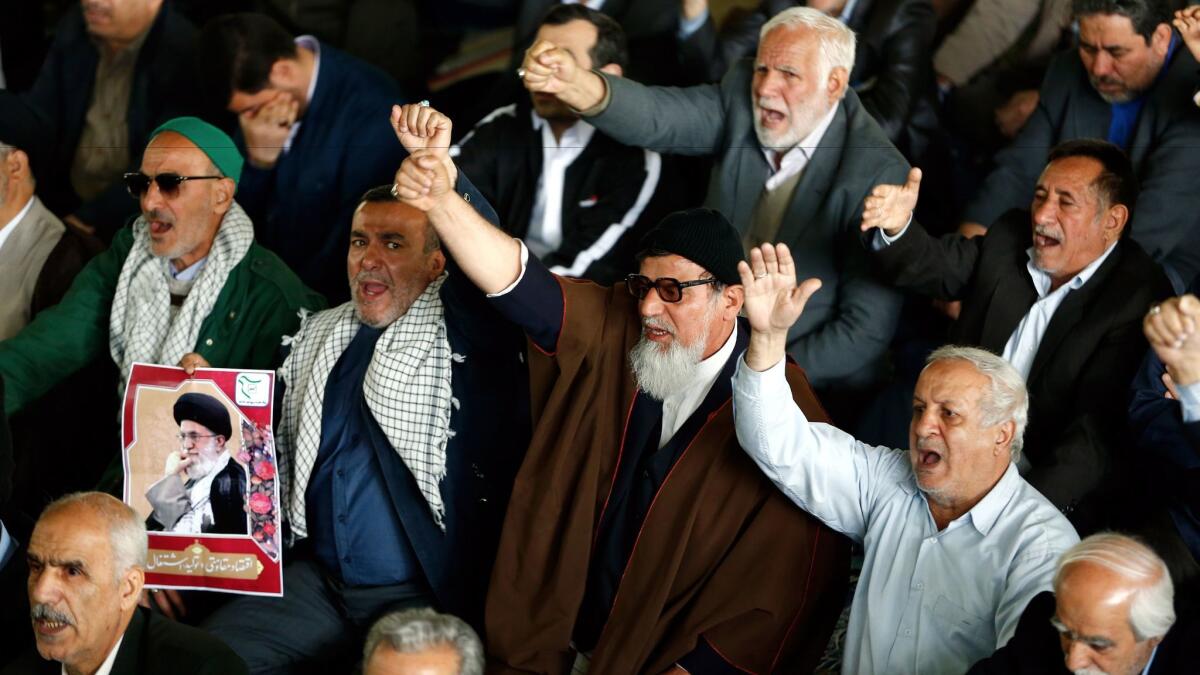Syrian ally Iran blasts U.S. missile strikes as ‘dangerous, destructive and a violation of international law’

Reporting from Tehran — Iran on Friday condemned the Trump administration’s missile strikes against Syria, saying the unilateral U.S. action would strengthen terrorists and “further complicate the situation” in the Middle East.
The Islamic republic, a strong ally of Syrian President Bashar Assad, said that whileit condemned the use of chemical weapons, the U.S. response was “dangerous, destructive and a violation of international law.”
The Pentagon fired dozens of Tomahawk missiles early Friday at a Syrian airfield in retaliation for a poison gas attack against civilians this week that the U.S. believes was carried out by Assad’s forces. It was the first time the U.S. directly targeted the Assad government since the Syrian conflict began in 2011.
Iranian Foreign Ministry spokesman Bahram Ghassemi rejected the conclusion that Assad’s forces had carried out the poison attack on Tuesday that killed more than 70 people in the town of Khan Sheikhoun, in rebel-held Idlib province. Doctors who treated some of the victims said their symptoms were consistent with exposure to the nerve agent sarin.
Ghassemi said the attack was “suspicious” and its “timing, actors and perpetrators are cloaked in a curtain of ambiguity.” He invoked Iran’s history as a victim of chemical warfare, carried out by Saddam Hussein’s Iraqi forces during a grisly war in the 1980s.
At Friday prayers in Tehran, where clerics deliver sermons that reflect the view of the ruling theocracy, Ayatollah Mohammad Emami Kashani echoed the Syrian government account, suggesting that poison gas was released when Assad’s military targeted a rebel weapons depot that had contained chemical agents.
“The chemical weapons are in the hands of terrorists and the Syrian army attacks the terrorists, but all are making a hue and cry that the Syrian regime has used chemical weapons,” Kashani said. “It is a sheer lie.”
Iranian Shiite Muslim militias, along with Russian air power and ground troops, have been among Assad’s strongest allies against the Sunni rebels, a patchwork of rival forces including extremists from Islamic State as well as more moderate groups trained and financed by the Pentagon and U.S. intelligence.
Western experts estimate that Iran spends billions of dollars a year to bolster Assad and support his military.
Iran has also recruited Shiite militiamen from Afghanistan and Iraq to fight alongside Syrian forces and help guard Shiite shrines in Assad-controlled areas.
Experts in Tehran said that Iranian and Russian support would help keep Assad in power barring a significant escalation by the Trump administration.
“As long as Russia is supporting Assad’s regime, these missile attacks are a flexing of muscle by Trump, but they are far from toppling Bashar Assad,” said Nader Karimi Juni, a leading political analyst. “In fact, America cannot topple Assad unless its ground forces land on Syrian soil.”
After Friday prayers, a small group of demonstrators shouted slogans denouncing the U.S. while some worshipers called for a strong response against the missile strikes.
“We should send more defenders of holy shrines to Syria and Russia should retaliate and bombard the American-sponsored terrorists in Syria too,” said Karim Hamwarsi, a worshiper.
Others were worried about a widening conflict. An elderly man riding Tehran’s subway, who gave his name only as Ali, said Iran’s support for Assad was coming at “a high price.”
“I am worried about future and there might be a war between Iran and America,” he said.
Special correspondent Mostaghim reported from Tehran and Times staff writer Bengali from Mumbai, India.
Follow @SBengali on Twitter for more news from South Asia
More to Read
Sign up for Essential California
The most important California stories and recommendations in your inbox every morning.
You may occasionally receive promotional content from the Los Angeles Times.











